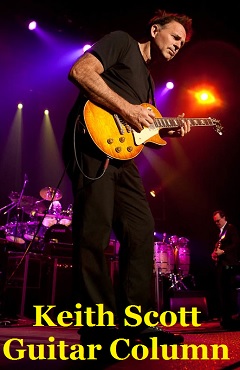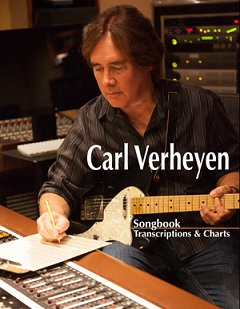Eric Barnett
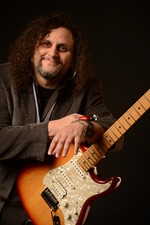
American rock instrumental trio POINTS NORTH has released their self titled second album, featuring impressive melodic tunes such as “Northstar” and “Child’s Play”, which is a must for all rock instrumental fans.
POINTS NORTH consists of guitarist Eric Barnett, along with ex-WHITESNAKE bass player Uriah Duffy and drummer Kevin Aiello. The instrumental trio is known for its “melodic guitar-driven instrument music”, as Eric Barnett puts it.
Eric Barnett was a finalist for Guitar Player Magazine’s 2008 Guitar Superstar Competition, judged by well-known players such as Andy Summers from THE POLICE, Joe Satriani, Steve Vai, Elliot Easton from THE CARS, and George Lynch, in which Eric Barnett’s extraordinary guitar technique was well received by the judges as well as the audience.
Eric Barnett took time to talk to MUSE ON MUSE in depth about his musical background, about how POINTS NORTH was formed, and about the new “Points North” album.
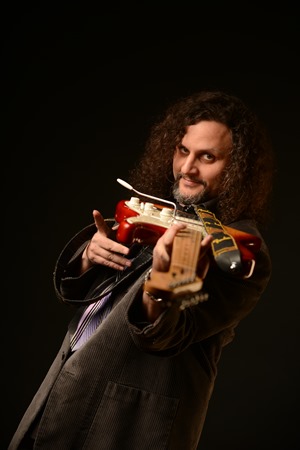
Interview / Text Mamoru Moriyama
Translation Louis Sesto (EAGLETAIL MUSIC)
Muse On Muse : At what age did you begin to take an interest in music? Tell us how it all started.
Eric Barnett : I started playing music at age 5, on the violin. That was my first instrument, my parents started me on it, and when I showed interest and aptitude music immediately became a huge part of my life. I went to the Manhattan School of Music, Juillard summer programs, played with the Princeton University orchestra; I was the kid practicing two hours a day while the rest of the neighborhood kids were out playing ball in the park (that I could see out my window). I didn’t discover rock music and the electric guitar until a bit later (aided by a bad case of teenage rebellion) – by which time I’d already been playing music quite a while, which made it a somewhat easier transition.
MM : Back when you started music, what kind of music and musicians were your influences / heroes? What made you like these musicians?
EB : Unequivocally, the first band that really hooked me was Rush. The complexity of the arrangements and the musicianship, the power, the depth of the sonic canvas, and even the lyrical themes – from the suburban alienation of a song like Subdivisions, to the heady concepts behind Hemispheres and 2112, their music just “spoke to me”. I also had an early affinity for many virtuoso guitar players – for example, my first concert was Yngwie Malmsteen, with Talas opening (Billy Sheehan on bass) – but it was Eric Johnson who truly moved me and inspired me to think about the guitar as “the voice” of the band – his truly singing tone and phrasing combined with impeccable technique that really brought forth the organic sound of the instrument, in some ways similar to a violin, was nothing short of a revelation and altered my approach to the instrument.
MM : Tell us about the first songs and artists you played / copied on the guitar. Tell us about any memories you have from those days.
EB : Well, obviously the aforementioned two (Rush and Eric Johnson). Steve Vai and Eddie Van Halen were two others that I certainly tried to copy; I remember staring at my speakers dumbfounded and trying to figure out how their seemingly otherworldly sounds were being created. But I was almost more into writing music than I was playing other’s songs, so I was writing and trying to record my own music right from the beginning, even as I was first learning the instrument. I can remember how happy I was when I got my first 4-track cassette recorder, and then an 8 track reel to reel.
MM : Many musicians start out by copying their favorite players, practicing and improving their techniques, before developing their originality and playing style. How was it for you? Tell us how you developed your current playing style.
EB : Since I’d already been playing music a while by the time I started playing guitar, my ear was at least developed…so I don’t know I’d say I had a “style” per se early on, but at least rudimentary technique came somewhat easy, and again, I was probably more focused on creating than copying – which helped to develop my own thing. But in terms of my current style – and honestly, I think or at least hope my style such that it is, is always evolving; there is always SO much more to learn and explore – I would say it was a while after I went to GIT that things really came together. Not while I was AT school, because that was largely information overload, and I came out of school with a head full of stuff that I didn’t really know how to apply musically – which I think is sometimes the knock on players that go there, and I can kind of get it if that’s the space a player stays in afterwards. But personally I can’t say enough good things about MI; while I’ve probably forgotten more than I remember from what I learned there, the rapid fire exposure to so many great players and myriad styles and the absolute immersion of the curriculum gave me the exposure and the building blocks that ultimately helped me to “find my voice”, if you will.
MM : When did you decide to become a professional musician? How did you spend your early years as a musician before you became a professional player?
EB : As if it was something that one could decide! I think that most folks who play or even try to play music for a living tend to do it because they have to, like a calling…because it’s not a path many would rationally choose. For me, I don’t know that there was ever a choice; it’s been a part of my DNA since my earliest memories. I’ve been in bands my whole life, I was a studio player in New York for a while, I did some touring supporting other artists, and commercial work. My focus was usually on whatever band was my main original creative outlet at the time, though.
MM : How did you form POINTS NORTH? Please also tell us about each member of the band.
EB : I can’t take credit for the band’s initial inception; our drummer Kevin Aiello is responsible for the first spark. I relocated from the East Coast, where I grew up, to Northern California where I live now, and I didn’t know many folks out here. More than wanting to get into a commercially focused project, I’d gotten kind of burnt out, and I wanted to do something fun…and I was perusing the musician listings on craiglist and found a posting that ultimately turned out to be from Kevin, looking for players to get together to create instrumental music, along the lines of the Steve Morse Band, Rush, and so forth. I hemmed and hawed and then decided to answer it – but it had expired! So I posted my own ad looking for the guy who wrote that ad – and Kevin saw it, and wrote me back.
He had already been in contact with Damien Sisson, the original bass player in Points North (and now the bass player in Bay Area thrash legends Death Angel), and the three of us got together and I think we left that first rehearsal with the bones of three songs. There really wasn’t intention to do anything other than create and play the music we were coming up with together, but Points North has just organically grown and grown since, and we don’t seem to have hit our ceiling, and we haven’t compromised a thing along the way. It’s truly unlike any other musical experience I’ve ever had; the lesson for me has been to be true to what you love, and if it’s good it will find its audience.
As far as the band members: well I’ve already mentioned Kevin Aiello, he’s the drummer, as well as one of my closest friends. Kevin’s a seasoned player who worked in different bands in the Bay Area for years; what I love about Kevin is that as much as he’s a fantastic player technically, it’s his writing and his ears and feel that floors me. He just “gets it”, not just musically but emotionally, and focuses on playing what’s right for the song or section. And a lot of the “prog” stuff that we do, the odd and shifting meters and musical left turns, they just seem to come effortlessly to him, which makes writing together a pleasure.
Our bass player Uriah Duffy, also one of my closest friends – I’m very lucky to play in a band with guys who inspire me both musically and personally – joined when Damien left to join Death Angel…and I still have to pinch myself at my good fortune, as Uriah was personally my first, second, and last choice to join Points North when we found we needed a bass player. I first saw Uriah play when Points North opened for the Eric Martin (Mr. Big) Band; Uriah was playing with Eric Martin that day. My jaw was on the ground; I remember saying at that show that Uriah was in my top 10 bassists ever just from watching that performance, and I’ve since revised that upwards!
The thing about Uriah is his absolute command of all styles, from the hardest most technical rock and metal to funk, soul…he’s played with heavy hitters across all genres – among others, Whitesnake, Christina Aguilera, Lyrics Born, The Family Stone, and Liv Warfield (of Prince’s New Power Generation) – and all of that stuff finds its way into what we write together too. I feel like we speak an unconscious language, whether on stage or writing together, like we’ve been doing it our whole lives. And the guy’s an amazing performer too, even as he’s playing impossible bass lines. I’m blessed to play with such talented guys.
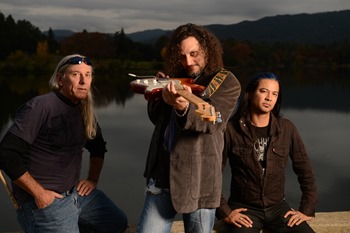
POINTS NORTH : l. to r. Kevin Aiello(ds), Eric Barnett (g), Uriah Duffy(b)
MM : Your new album “Points North”, following up on the debut album “Road Less Traveled”, definitely shows some catchy melodies, while also displaying some thrilling performances of what you would expect to hear from a trio band. What was the concept behind this new album?
EB : Well, obviously the lineup changed for this record, with Uriah replacing Damien…and one of the really interesting things even before we started writing new songs together was the subtle ways that the “Road Less Traveled” songs changed, as Uriah brought his style into the band. I know for me, when we started writing this record, I was most interested in what this lineup truly sounded like, when we were playing the music we created as opposed to the earlier Points North songs…so I think as much as anything, it was a search for that sound, how much could the three of us really express ourselves and hone in on the sound that was the product of what the three of us do, both as individuals and together. There really wasn’t all that much conceptual intention; in fact, the writing came, if not effortlessly, than at least without much friction. As with “Road Less Traveled”, it was pretty uncompromising. But I think two things we did find is that we all gravitated towards tighter, more focused, dare I say “commercial” compositions, while somehow simultaneously dialing up the level of performance and musicianship, and that we all really stretched ourselves as writers and players along the way. It was quite a journey, that’s for sure.
MM : The songwriting credits are listed under the whole band POINTS NORTH. Can you tell us how the songwriting was actually done? Was there more input from certain members? Did someone in particular work more on lyrics, on melodies, etc…?
EB : Great questions…the songs are credited to Points North because we feel like even where one or the other of us might have written more, that without the three of us it wouldn’t be a Points North song. While we have our areas of specialty for sure, everyone contributed. Every song was different; sometimes I might come in with something more fully formed; sometimes Uriah might, other times the entire song might be written collaboratively in the band room. I would say that in general, as the “voice” of the band, I carried more of the melodic focus, but even that wasn’t true across the board – for example, a song like “Northstar”, where for much of the song I’m playing a more supportive role to Uriah’s melody. There wasn’t any formula, it just all happened the way it happened for each song, and it was egoless and productive and fun…we’re already itching to write some more, in fact.
MM : 9) Many of the songs, such as “Northstar”, as mentioned in the previous question, have a very catchy melody to it. Is there anything particular you keep in mind when playing these melody lines on the guitar?
EB : None of us spent the majority of our musical career playing in instrumental bands, and accordingly I think we all tend to focus more conventionally on the song, more so than playing or execution or technique. The guys I most admire in the genre, like Joe Satriani, Eric Johnson…they may write instrumental music, but its their songwriting that is arguably most memorable, and appeals to listeners of all types. Just because a song is instrumental, doesn’t mean there isn’t the same responsibility to create “hooks” – which can be melodic, stylistic, what have you – if anything, there’s maybe even more responsibility than in a vocal song, since there isn’t the lyrical content there to connect emotionally and viscerally with the listener. But music has the amazing power to convey emotion, and melody is of course a big part of that.
In terms of execution, it’s a little cliché to say that I “think like a singer”, but its true to an extent…I feel the phrases should all speak, should say something to the listener…whether that’s in the inflection of a slide or vibrato, or the aggression of a particularly fast picked passage. I do the best I can to carry the feeling of the melodic content, whatever that is…it’s more felt than intentional, from the heart rather than the head. The best shows with Points North, when we get off stage I can’t remember a note I played, because I was in the moment of creation, and that’s what I strive for…to “get out of the way” and let the notes speak for themselves.
MM : Besides the main parts that we hear on each song, there seem to be many parts in the background, such as rhythm guitar parts and keyboards that definitely give the music more depth. On “Harlequin” you also have piano parts that really create a beautiful vibe for the song. Tell us what kind of approach you take when playing these songs live as a trio band.
EB : All of the songs were originally written as a trio, and we “tested them out” live as a trio before we went into the studio. And when we did the overdubs on the record we were conscious not to do too much that would make the songs feel markedly different live than the recorded versions; Points North is ultimately a live band first and foremost – though I do feel on this record that we also got a lot of that live feel, thanks primarily to our wonderful engineers and associate producers; Danny Danzi who mixed and mastered and provided sonic guidance and mentorship, and Dave De Villers who oversaw the tracking. Yes, it’s true that the overdubs flesh out the sound, but if you see us live I don’t think it doesn’t feel like there’s anything “missing”, since the songs all stood on their own with just the three of us before we started tracking them in the studio.
The exception to that though is the song you pointed out, “Harlequin” – from the acoustic guitars, to the piano, it’s the song that sounds the most different when we play it live, though the structure is the same. The acoustic guitar was a happy in-studio decision; originally all the melodies were on electric. We also had the opportunity to work with a brilliant composer and keyboard player on this record named David Earl – and while a lot of keys on the record are more in the background, on Harlequin I had always heard piano in my head, and David did a brilliant job…we sat in his home studio together and worked on it, and I can say for myself that I got chills during the middle breakdown the first time he played it. We’re planning on having him join us at our CD release show to perform the song with us, and I can’t wait.
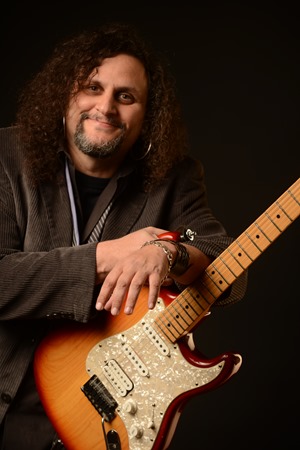
MM : Tell us about each song on the album. How the song came to be, about any background or meaning behind the song, etc.
EB :
“Ignition”
Ignition was originally called “Lobotomy”, because Uriah showed up at a rehearsal after a particularly rough night out the night before with the opening main riff. It’s become our set opener, and I think it’s the song that best exemplifies overall the current sound of Points North in its totality.
“Northstar”
This song really features Uriah, and he brought in a lot of it, though the arrangement changed a bit as we worked it into a Points North piece. I love listening to him play the bass solo in the middle when we play the song live, and it’s an audience participation song too – I like getting folks to clap along during the beginning and middle solo bass melody parts.
“Child’s Play”
I’m really proud of this song myself – to me it’s the most complete “guitar statement” on the record. It’s a “guitar epic” kind of a song, with plenty of difficult bits – but one of the ways in which I tried to challenge myself on this record, even in the songs where the guitar got more technical, was to be conscious to leave space, whereas my natural tendency is to make things kind of dense. I really like how that came together in this song, and when things do climax I think it gives it that much more intensity.
“Sky Punch”
This was the first song written for the new record; the opening idea came to me while Uriah and I were driving home together from a show, and I recorded the idea on my smartphone propped up in the trunk of my car so I didn’t forget it. It has some things more in common with the songs on “Road Less Traveled” to me than some other songs on the record, but the band’s evolution is apparent in things like where we trade off solo spots in the middle, or the major/minor sophistication of the main riff that carries along into the solo section.
“Rites of Passage”
This is easily the hardest song on the record for me to play. Uriah also needs three hands to play what was originally a guitar part on the bass, the wide broken chord figures that anchor the chord changes. I really felt like I pushed myself hard on this one; the underlying chord changes aren’t trivial, the whole song is basically odd meter, it’s technically very difficult – and yet also needs to be tender in spots, deeply emotional, fiery, melodic. The melodies all kind of wrote themselves. One place I drew inspiration from was Steve Vai’s “Tender Surrender”, which has some of the same kinds of elements in it, it’s one of my favorite songs of his, and there’s a nod or two in there to Mr. Vai stylistically, at least my interpretation of him.
“Colorblind”
This was the last song on the record that was written and recorded; the whole thing was done in a weekend, from idea to completion. Peter Morticelli, the president of Magna Carta Records, challenged us as a band to create a song with a “vocal element”. I think what we gave him was closer to a conventional vocal song, but it was a lot of fun to do. I like how it came out, and some folks say it’s their favorite song on the record; to me, it’s more an indicator of what we might do in the future. I wish we’d had a bit more time with it, just because we were running out of studio time and the deadline to ship the record, but I’m glad we did it.
“Harlequin”
One of my personal favorites on this record; the evolution of this song from when we started working on it to the finished product was a fantastic journey. Definitely a departure for the band, but I love the feel, the acoustic guitars, the piano, the densely layered ride out. The main chord changes and structure came from a bass part that Uriah had put together, and it’s just a beautiful set of changes, it was so much fun to work with.
“Turning Point (La Villa De Villers)”
So many songs on this record are shorter, focused…progressive for sure, but tightly arranged, and as you said earlier, “catchy”, or at least we hope so. So about two thirds of the way through, Dave DeVillers, the tracking engineer said to us – “hey wait a second guys, you’re a prog band. Where’s your prog epic?” So the working title to this song was “Prog Epic”, and there was definitely some intention around that when we were writing it. The title of the song was a nod to Dave, and to his hospitality – since he lived close to the studio, there were many nights spent at his house – and also to Rush and THEIR epic instrumental “La Villa Strangiato”.
“Redeye”
This was one of the later songs written, very high energy and a little schizophrenic in the arrangement…I was flying a lot at the time, a lot of overnight flights, and I don’t sleep well on planes…and the song just kind of gave me that same sort of tense, relentless feeling, which is where it got its name from. The guitar solos are pretty over-the-top, along with the drum and bass breaks. This song seems to be getting played on the radio a bit, which is interesting; I’m guessing it’s those same over the top qualities that are resonating with listeners.
“Foxes & Cougars”
We were originally going to call this song “Vinnie’s”, in honor of a venue in Concord that we play quite a bit; it’s that old 70s swing/boogie feel, and it’s a lot of fun to play live. The guitar/bass battle between Uriah and I, I have to give a shout out to my friend Danny Jones; Uriah used to play with him in his band, and they used to do a battle like this in their set. It was pretty spontaneous in the studio, the tradeoff section; we didn’t have anything really written for it before we went in to record.
“Killer Pounder”
Another song where we stretched; the main riffs remind me a bit of something Nuno Bettencourt might do – he’s a truly brilliant and often underrated player – and the middle section features the first (and probably last) disco break on a Points North record. We’ve gotten great feedback on this song; certainly it hits as hard as anything on the record, but had more focus on the groove, even though it’s not in 4/4. I also want to give a special thanks to Kevin, who I think played his butt off to get the feel of this one right.
MM : Please tell us about your gear. What guitars, guitar amps, effectors, foot pedals did you use for this recording?
EB : My main guitar is a Fender American Texas Special Fat Strat. It’s mostly stock, with Texas Special pickups in the neck and middle position, and the Seymour Duncan “Pearly Gates Plus” humbucker that comes with the guitar in the bridge. I had a little work done on it, by my tech Steve White – the saddles are Graphtech graphite instead of the stock metal ones, to help reduce string breakage, the string tree was changed, and the tuners are Sperzel locking tuners. My main amp is an Egnater Renegade 2×12. There are so many things I like about it. It’s compact yet powerful. It has two separate sets of power tubes, that can be blended in each channel – a set of 6L6s which are more Fender-like, and a set of EL34s, which are more Marshall-like. I set the clean channel to me more 6L6, and the dirty channel more EL34, and this gives me sort of a poor-man’s Eric Johnson-style dual amp rig. For effects, I have a TC Electronics G-System, which I use in a “4-cable” setup, and it takes care of everything except overdrive. My overdrive pedal is a custom pedal by a Bay Area guy named Paul Trombetta, and I can’t recommend his stuff highly enough…silky smooth gain, but also transparent, really preserves the sound of the guitar. And I use Mogami cables, which are beyond reliable and preserve the signal strength. I also use a Fractal Audio Axe-FX, which is truly the cutting edge of modern guitar processing technology. I’m lucky to get to work with the folks at these companies too, which is nice because it’s great to work with manufacturers whose gear you love.
I have some other guitars to of course, but the one I want to talk about is my prototype Epiphone Les Paul that I got to work on with the folks from Antares when they were building out the Autotune for Guitar technology, it’s a truly awesome Swiss-army knife of an instrument that lets me do so many different things without having to carry an army of guitars with me. The tuning feature is helpful, but it’s the other stuff – modeling, alternate tunings, capoing up and down, and so forth – that have just proven invaluable, especially in the studio…Andy Hildebrand of Antares is a genius, and it was really a wonderful experience to work on the technology with the folks there.
MM : A message to your Japanese fans please.
EB : I’d love to come play for you! Points North hasn’t had the chance to play in Japan yet, but we do hope we’re able to correct that deficiency in support of this record. And thank you all so much for the amazing support, especially to those of you who’ve picked up either of our records, or watched and shared our first video, and to Muse on Muse for the interview; what a great publication!
POINTS NORTH Official Site : http://www.pointsnorthband.com/
POINTS NORTH Magna Carta Site : http://magnacarta.net/pointsnorth/
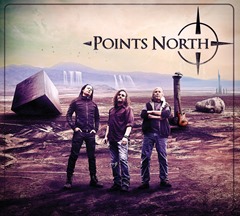
Points North / POINTS NORTH
1. Ignition
2. Northstar
3. Child’s Play
4. Sky Punch
5. Rites of Passage
6. Colorblind
7. Harlequin
8. Turning Point (La Villa De Villers)
9. Redeye
10. Foxes & Cougars
11. Killer Pounder
